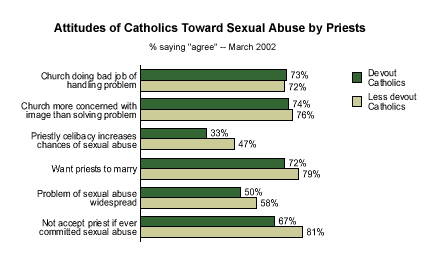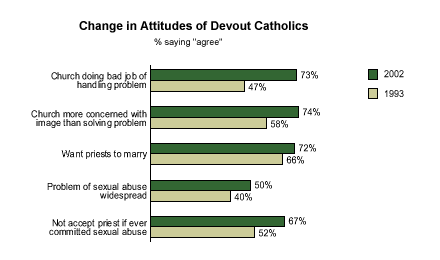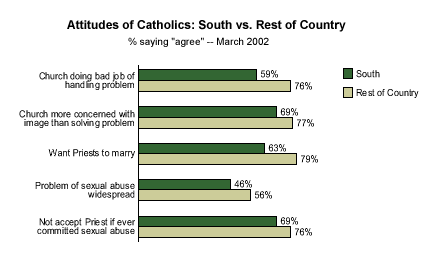A new Gallup poll finds that Catholics are highly critical of their church for the way it has handled the problem of sexual abuse by priests. (See Catholics: Church Doing Bad Job of Dealing With Sexual Abuse by Priests.) Devout Catholics, those who attend church weekly or almost weekly, are also highly critical of this problem, although their views do differ slightly from those of Catholics overall. Catholics' views on this matter also tend to differ somewhat by geographic region, with Catholics in the South generally less critical of this problem than those in other regions.
The views of devout Catholics, who represent just under half of all Catholics, do not differ substantially from the less devout (those who attend church about once a month or less) in their criticism of the church. But the devout are less likely than the rest of self-identified Catholics to think the problem of abuse by priests is widespread and that the requirement of priestly celibacy caused it. The devout are somewhat more likely to say they would allow rehabilitated priests back into a parish.

Though only a third of devout Catholics believe that the requirement of priestly celibacy leads to higher rates of sexual abuse among priests, two-thirds of devout Catholics favor allowing priests to marry. And while the devout are more likely than the less devout to say that rehabilitated priests should be permitted back into a parish, a majority of the devout would not accept them.
Changes Since 1993
Devout Catholics are much more critical today of the way the church is handling sexual abuse by priests than were devout Catholics in 1993**, when similar news stories were being reported. At that time, 47% of devout Catholics said the church was doing a bad job dealing with the matter, compared with 73% who feel that way today. Also in 1993, a clear majority of devout Catholics, 58%, said the church was more concerned about protecting its image than with solving the problem, but that is far lower than the 74% who express that view today. In the past nine years, devout Catholics have also become somewhat more willing to allow priests to marry, more likely to say the problem of sexual abuse by priests is widespread, and more likely to refuse to allow a rehabilitated priest back into the parish.

Southern Catholics Somewhat Less Critical of Church Than Catholics in Rest of Country
The poll suggests that about one in five Catholics lives in the South, and that they are less critical of the church than are Catholics in the rest of the country. As shown in the accompanying chart, 59% of Southern Catholics think the church is doing a bad job of handling the sexual abuse problem, compared with 76% of Catholics who live in some other region of the country. A similarly large margin of difference is found in the number of Catholics who favor letting priests marry: 63% of those living in the South, compared with 79% of those living elsewhere. The differences between Southern and non-Southern Catholics are smaller on the other items. Still, regardless of these differences, even Catholics in the South are highly critical of their church.

*Results in the current poll are based on telephone interviews with 522 Catholics, aged 18 and older, conducted March 18-20 and March 22-24, 2002. The sample of Catholics was based on respondents who identified themselves as Catholic in response to Gallup's standard religious identification question in two national probability samples conducted over the dates listed above. For results based on this combined sample of 522 Catholics, one can say with 95% confidence that the margin of sampling error is ±5%. For results based on just "devout" Catholics, those who say they attend church "weekly" or "almost weekly," a sample of 249 Catholics (representing 48% of Catholics), the margin of error is ±7%.
**Results in the 1993 poll are based on telephone interviews with 788 Catholics, aged 18 and older, conducted Aug. 3-5, 1993, using the same sampling methodology as in 2002. For results based on this sample, one can say with 95% confidence that the margin of sampling error is ±4%. For results based on just "devout" Catholics, those who say they attended church in the past seven days, a sample of 384 Catholics (representing 46% of Catholics), the margin of error is ±6%.
In addition to sampling error, question wording and practical difficulties in conducting surveys can introduce error or bias into the findings of public opinion polls.
